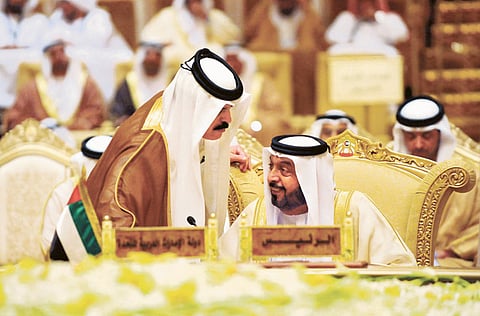Call for unified water strategy
Abu Dhabi declaration urges stringent standards to tackle growing demand

Abu Dhabi: A 15-point strategy to combat scarcity of water in the Gulf was announced in Abu Dhabi on Tuesday at the end of the 31st GCC Summit.
The declaration acknowledged the growing need for water to achieve social and economic development objectives in the Gulf countries.
The declaration stated that social and economic achievement in the Gulf over the past decades will be endangered if water issues were not addressed.
The Abu Dhabi Declaration urged the authorities concerned in the GCC nations to set up a comprehensive long-term strategy to tackle urgent issues of water.
The strategy must be submitted before the Supreme Council for approval as an urgent issue. The unified strategy on water must be implemented throughout the bloc, the declaration said.
Climate change impact
The declaration was read out at a joint press conference by Shaikh Abdullah Bin Zayed Al Nahyan, UAE Minister of Foreign Affairs, and Abdul Rahman Hamad Al Attiyah, outgoing secretary general of the GCC.
The announcement was made at the conclusion of the Summit held by the six-nation bloc. "The strategy should examine the impact of global climate changes on local water resources in the region and look into ways to adopt with the negative factors," Al Attiyah said.
"The GCC has to adopt a unified policy regarding rationing of water consumption in different fields and strike a balance between expansion in water production and scarcity and the need for water for irrigation purposes."
Al Attiyah said the impact of water desalination on the quality of sea water should be studied carefully from various aspects. "Any increase in the salinity of sea water as a result of expansion of desalination projects might have a negative impact on the biodiversity of sea water in the region," he said.
Growing needs
There is a need to establish links between diversity of energy resources, food security and prompting of water production capabilities in the region, he said.
Shaikh Abdullah said that oil and gas resources in the Gulf are not enough to cater to the growing needs for water in the region and there is an urgent need to diversify energy sources.
The declaration called on the authorities to deal with issues related to environmental indicators, especially carbon footprint and work to enhance the performance of the GCC in this field.
It called for establishment of national and regional standards regarding the increasing carbon footprint in the field of power and water production and in housing.
Shaikh Abdullah said the declaration called on the GCC to set up research centres for energy development and desalination of water and diversification of production of non-fossil energy.
Legal framework
The declaration highlighted the need to set up a legal framework to handle issues related to efficiency in power and water production and rationing of consumption in the region.
Shaikh Abdullah said the GCC can not allow growth in consumption of power and water without limit. Any activity and project in the Gulf must be judged by its adherence to efficiency standards set by the bloc.
He said the consumption of water per capita in the Gulf is one of the highest in the world.
"The GCC has to tackle this issue by adopting laws and setting up incentives. Encouraging inventions and use of new technology must be part of the rationing strategy in the region," Shaikh Abdullah said.
He called for enhancing the standards of water desalination plants throughout the Gulf.



